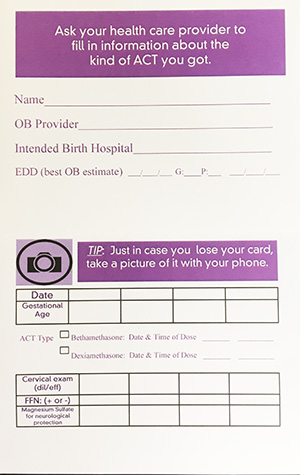Our CMOP teams have spent the past several months improving the care and outcomes of their patients and their infants by focusing on administering a full course of antenatal steroids on those at risk for pre-term delivery.
As outlined in the ACOG guidelines, treatment with corticosteroids is recommended for pregnant women between 24 and 34 weeks of gestation and is associated with significant reductions in neonatal morbidity and mortality.
Our teams completed small tests of change to ensure all staff were educated on the critical timing of optimal administration of corticosteroids. Additionally, teams focused on standardizing care across the state from large tertiary centers to small referral centers.
As with all our initiatives at PQCNC, we recognize the success we achieve would be suboptimal without the partnership and collaboration of our patients and families. Implementation of an Antenatal Steroid (ANS) Passport tool that incorporates the patient in care, was one of our most successful achievements in meeting our goal of full course steroid administration. This tool ensures the patient is at the center of her care and provides a means to facilitate communication between doctors and facilities.
If an at-risk mother enters a triage or small referral center and receives a dose of steroids, she is given a passport tool which documents necessary details of the steroid she receives. She is encouraged to carry this card with her, as well as take a photo of it with her phone, in order to provide accurate medical information to the next hospital or doctor she visits.
Incorporating patients in their care is a simple and necessary to achieve optimal outcomes in this special population and at times complicated system of care.

